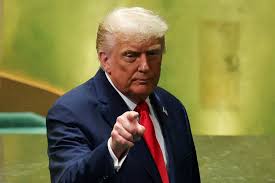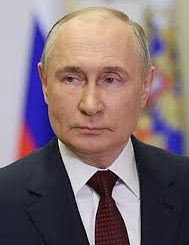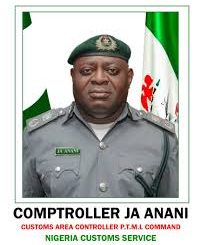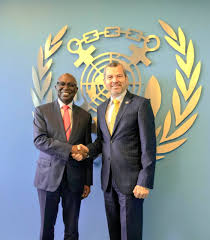By Stephen Ubanna
Donald Trump, the North American President of the United States, appears to have shot himself in the leg by initiating a trade war with the Asian country of China. Trump had imposed a harsh tariff on Chinese imports into the ounry as well as put export controls on critical exports to China.
The US President may have taken the bold economic initiative to increase the amount of tax raised by the government, and to encourage consumers to buy more of American-manufactured goods to boost the country’s investment rather than depend on Chinese and other foreign products.
He may have had it at the back of his mind that the increase in the tariffs imposed on foreign goods, particular, Chinese goods coming into the American market would reduce the gap between the value of goods it imports from China and other trading partners across the world, including Narendra Modi’s home country, India pharmaceutical products — and exports to these trading partners, but got it wrong.
The American President may have forced Xi Jinping, the Chinese President, to hit back at the US economy by tightening its rules for exports of rare earth elements, forcing the American President to cry out. An aggrieved Trump, who said that the trade war between the US and China is “unsustainable, had” lamented that Jinping, the Chinese President, had taken advantage of ”the country’s control of 70% of the global rare earth elements by becoming very hostile and trying to bring the North American country and the entire world to their knees”.

President Trump’s harsh economic tariff may have hit the US economy so hard that the defense, technology, and IT industries are no longer finding it easy, as prices of their locally manufactured products have skyrocketed , forcing Consumers to now prefer the Chinese and other foreign products, which are more affordable.
The situation is worrisome as the military personnel at the over 700 military bases across the world including Qatar, in the Middle East and Germany, described as the largest concentration of US forces, were said not to have been paid.
These had been attributed to the shutdown of the government on agreements between the ruling Republicans Congress men and women and their Democrats Counterparts due to financial constraints.
Frederick Merz, the Germany Chancellor may have realized that it would affect NATO,support to the Ukraine war that his government has taken the bold initiative to pay the salaries of well-over 2,000 local and national employees at the US, military bases if the US government shutdown delays the military personnel and other workers salary in this month of October.
President Trump, who many believe is now running from pillar to post to remedy the damage that has been done to the country’s economy due to the harsh tariffs imposed on China, India, and other foreign trading partners, was said to have tried to calm frayed nerves and restore hope to the country’s heavy industries.
He had assured them that there was no cause for panic, stressing that the government had stockpiled over $1 billion worth of rare earth elements as countermeasures against China’s strict export controls.He was emphatic that he could not sit by as the President of the US and watch the country’s economy collapse because of the trade war with China, insisting that he had to financially counter China rare earth export control moves.
The US President may have moved quickly to pressure countries that are richly endowed with minerals and rare earth elements to allow US companies to have access to them. IHe may have played on the intelligence of Felix Tshisekedi, the President of the Democratic Republic of Congo DRC, in the guise of settling an age-long war with Paul Kagame’s home country, Rwanda, to gain approval for the US access to the country’s US$24 billion cobalt and other mineral resources across the country.
At present, Trump’s home country have succeeded in taking over the mining of cobalt and other rare earth elements in the country, by establishing a military base that could access to the DRC’s military installations to ensure the security of supply routes and ensure that the supply of rare elements reaches their various destinations in the US without any disturbance from the various M23 group warlords in the country.
He may have also tried to penetrate the ranks of the Junta Leaders of the Alliance for Sahel States — Burkina Faso, Niger, and Mali — to gain access to the Sahel countries mineral resources and rare earth elements, but was disappointed.
His recent emotional outburst over Ibrahim Traore, an Army Captain and interim President of Burkina Faso, who had kicked out the former colonizer, France and closed its military bases in the country after what he described as years of” investment and security efforts, to stabilize the country” speaks volumes.
The visibly shaken Trump had criticized Traore for turning his back on the West and embracing Vladimir Putin of Russia, which is currently at war with Ukraine, but in actual fighting the EU and NATO, countries, including the US and the UK over resource control in Ukraine.
In apparent response to Trump’s cries, President Putin of Russia may have made matters worse for him and other Western leaders when he declared that “the era of Western domination is over.”Trump may not have seen it coming as Capt. Traore of Burkina Faso, Generals Abdulrahamane Tchiani , Niger and Assimi Goita, the Malian Leader, had taken the bold decision to control their respective countries’ minerals and rare earth elements locally instead of the decision concerning its mining and export being taken and controlled from Paris or Washington.
take for instance, the Burkina Faso government alone, had nationed the country’s five foreign gold mines and was to have generated the US $18 billion from the export of gold alone in two years, for a country described as ”impoverished” by France, which did not go down well with the Us President Trump and Emmanuel Macron , of France, who are battling to save their countries from the brink of economic collapse.
Ursula Von Leyen, President of the European Commission, may have spoken the mind of other European Leaders, when she declared that that Europe will not allow the Sahel states of Burkina Faso, Niger and Mali, endowed with rich mineral and rare earth elements to slip out of their hand to be taken over by Russia and China, without a fight.
This is an indication that the ongoing trade war between the US and China, would be nothing compared to brewing war for control of the Sahel region mineral and rare earth elements between the Western nations including US and China .
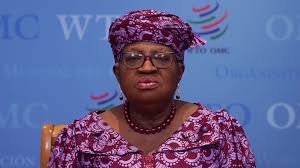
In a related development, Ngozi Okonjo-Iweala, a former Minister of Finance and Coordinating Minister of the Economy during President Goodluck Jonathan’s administration, and now Director-General of the World Trade Organization ,WTO, which many believe had not been able to settle any known trade dispute between countries over the years may have sent a message to member nations that ”it can bark and bite”.
The World Trade body was said to have sent a chilling warning to the US and China to sheath their swords, stressing that a full-blown trade war between the two economic giants and incidentally world powers would polarize “the global economy into rival blocs and slash world trade growth by 7% in the long term.”
Okonjo-Iweala, the WTO helmswoman, who could not hide her feelings, said that this tit-for-tat approach between China and the US, the world’s two largest economies whose bilateral trade accounts for roughly three percent of global trade, carries wider economic implications if allowed to drag on, as “it would severely damage the global economic outlook.”
Appealing to the leadership of China and the US to settle their trade scores, she noted that “a division of the global economy into two rival blocs could lead to a long-term reduction in global real Gross Domestic Product (GDP),” which she put at seven percent.
The former Nigerian Minister of Finance advised that Presidents Jinping and Trump must move fast to resolve their trade disputes through dialogue to avoid turning the developing economies in Asia, Africa, South America, and other parts of the world into a punching bag. She warned that these countries, whose economies are still struggling to survive, would not be able to bear the heat of the fallout of the global trade war between the economic giants.
Hear the WTO Director-General: “Trade diversion remains an immediate and pressing threat, one that requires a coordinated global response.” Without sounding immodest, she alluded to the fact that Trump had started the trade war with China when he first announced on April 2, 2025, a new trade tariff against China, India, Russia, Brazil, and other trading partners, including Nigeria, which was further reviewed upwards on April 10, 2025, signaling a sharp escalation in trade tensions and a renewed push for Trump’s “America First” agenda policy.
The pressure from Americans over the rising cost of locally manufactured products compared to Chinese goods may have forced him to suspend most of the newly imposed harsh tariffs on trading partners on Wednesday, October 15, 2025, reverting to a universal 10% rate. However, he failed to reduce the Chinese products tariff, which now faces 125% tariffs, up from 104%.
Talking tough, the WTO Chief Executive Officer urged member nations not to worry about the trade dispute between China and the US, as they have an agency “to protect the open rules-based trading system.” It was not surprising that she declared that “resolving the trade war between China and the US, which is still within a cooperative framework, is still essential.”

